Papers by Andrew O'Sullivan

O’Sullivan, A. (2013) ‘Gulf Comparative Education Society’s Fourth Annual Symposium ’, in Bridging the Policy/Research Divide in Education in the GCC. Ras al Khaimah, UAE: GCES, pp. 110–119. , 2013
I take my title from a 2002 article by Ann Oakley concerning the move in academic and policy circ... more I take my title from a 2002 article by Ann Oakley concerning the move in academic and policy circles towards strengthening the research evidence base in the social sciences. Educational research was often deemed deficient in its use of evidence and thus seen by many actors as a particularly ripe area for the adoption of a much more “evidence-based culture”. Over the past few years I have been focusing my research efforts on investigating the use of evidence in the field of education leadership, decision making, and educational policy. The complexities surrounding the nature and understanding of what evidence is; what constitutes evidence, and how evidence is formed and rendered counter poses the attractive directness of the almost common sense assumption that “good” evidence helps in the formulation of better policy and leads to improved practice. The notion of disinterested, objective evidence guiding the policy maker must be examined. Where does the evidence-based approach originate from? Where does the evidence based ‘movement’ reside in terms of its epistemology and its world view? How is evidence deemed compelling or convincing enough to advocate a change or reform policy? What implications for educational practice does a more evidence based policy imply in terms of its constructs of education and research (their conduct, role and purposes)? Where does the evidence-informed policy movement impact educational policy formulation and decision making here in the Gulf region, and in the UAE? There appears to be a growing space in the policy field for advocational research primarily concerned with providing policy actors with supportive data to formulate policy matching their ‘ideological and political constraints’ (Lauder, Brown and Halsey 2009: 5) and with convincing actors of the need for certain types of reform.
Lauder, H., Brown, P. and Halsey, A.H. (2009) Sociology of education: a critical history and prospects for the future. Oxford Review of Education, 35 (5): 569-585
Oakley, A (2002) Social science and evidence- based everything: The case of education. In Educational Review, Vol. 54, (3): 277-286
ELT journal, 1993
... The seminal work in 'Teaching English to Arabic Speakers' (... more ... The seminal work in 'Teaching English to Arabic Speakers' (TEAS), as far as I am concerned, is the 1963 publication by Raja T. Nasr: The Teaching of English to Arab Students. ... For this novice TEAS practitioner, Nasr's book was a great help. ...
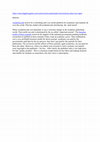
Academia.edu used to be a refreshing and very useful platform for academics and students all over... more Academia.edu used to be a refreshing and very useful platform for academics and students all over the world. That has ended with academia.edu introducing the 'paid search'. When Academia.edu was launched, it was a welcome change in the academic publishing world. That world was and is dominated by the so-called 'important journal'. The business model of these journals rested on the support of the national governments pushing academic researchers to publish in those journals if they want an academic career. That combination was a very profitable business model for those journals: academics are paid by the governments (and thus by the taxpayers), they don't get paid by the journals for their publication. The reviewers and the editors of these journals, again academics, are not paid for their job either. Moreover, when you submit your research to such a journal, you transfer your copyright to the publisher – for free. After which, the publisher asks a very high price for that 'quality product'. This is a business model based on free labor and making research unavailable for students or researchers who don't have a subscription.

[FULL PAPER AVAILABLE ON REQUEST]
Dubai in the United Arab Emirates (UAE) is acclaimed the poster... more [FULL PAPER AVAILABLE ON REQUEST]
Dubai in the United Arab Emirates (UAE) is acclaimed the poster child of the boom in international education with record numbers of such schools in operation in the Arab emirate and more slated to open over the next decade. Despite this spectacular growth there is surprisingly little in the literature on international education about the Dubai context. This paper attempts to address that gap in a small way.
The private international education sector’s growth is examined with reference to statistics describing the expansion and to the notion of Dubai as an educational hub. The nomenclature and typology of the study of international schools are investigated and the claim that many of the more recently established private schools in Dubai are “international” is interrogated.
The evolution of the modern education sector is presented in summary capturing the main trends and changes particularly since the constitution of the UAE federation in 1971 highlighting the “crisis” rhetoric which has emerged around the public K12 provision in Dubai in the last twenty years.
The “flight” of local students to the private sector schools is discussed and compared with the phenomenon in other jurisdictions. While there are some common cross-national drivers which explain this flight, this paper also argues that the Dubai government promotes the uptake of private education by national families as a solution to the intractable problem of declining public K12 school quality, in line with the government’s own voluntary embrace of neoliberal market led reform ideologies (Marginson 1999).
Finally, the move of local host national students to the private international schools is problematized in terms of the potential problems it may pose for questions of national identity and class cohesion and equity within the UAE National community in Dubai.
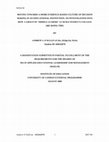
In this dissertation the author presents a small scale study on the move towards a more evidence-... more In this dissertation the author presents a small scale study on the move towards a more evidence-based decision making approach in the management of academic departments and programmes at Dubai Women’s College (DWC), part of the United Arab Emirates (UAE) Higher Colleges of Technology (HCT) system. Focussing on a small group of ‘middle leaders’, the study seeks to analyse how the process of establishing an evidence based culture in an educational institution unfolds and what educational leaders can learn from this process. Using a review of pertinent literature, a small survey, interviews and an analysis of relevant institutional documents, the dissertation examines the nature and scope of evidence-based approaches for decision making; investigates this in the DWC context; identifies what the target group believe constitutes evidence; describes how they work with evidence; and examines key variables such as organizational culture, the role of IT and management information systems and the influence of various paradigms and models like school effectiveness, school improvement, quality management, and learning communities in the whole process of moving to more evidence based (EB) approaches.

Proceedings of the Second International Conference on Emerging Research Paradigms in Business and Social Sciences (ERPBSS) held in Dubai from 26-28 November 2013, 2013
This paper examines the phenomenon of educational policy transfer in the United Arab Emirates (UA... more This paper examines the phenomenon of educational policy transfer in the United Arab Emirates (UAE). It is argued that our age has witnessed a phenomenon of “the accelerating transnationalization of policy norms and practices” (Peck and Theodore 2010: 169) across national borders as states seek models and exemplars for their own educational development. A variety of mechanisms has been postulated for the apparent „movement‟ of policies from an originating context, and their adoption in other national environments labelled with terms such as: 'Policy Borrowing'. These mechanisms are sometimes advocated as a “shortcut to desired outcomes and results” justified by the impetus provided by the “global pursuit of competitive performance and the discourse of the knowledge economy” (Aydarova 2012:15). This paper asks: What policy influences are manifest in the UAE context?The metaphors of scapes, networks and flows are 'appropriated' from the work on mobility developed by Urry (2000)allowing for a more fluid and accommodating frame to describe and analyse the influence of policies from other contexts on the UAE. Ball (2012) counsels that policy transfer research methods and sensibilities be more attuned to movement and owe less to structure and place. The mobility construct applied to policy flows embodies a comprehensive view of transfer and influence from one context to another as movement of “people, objects, capital and information across the world” (Hannam, Sheller, and Urry 2006: 1).Policy transfer, discourse and influence can be „carried‟ by various vectors with the focus on the enabling role of technologically facilitated globalized mobility with its inherent alacrity.
Elt Journal, 1995
The place of culture in English Language Teaching

This paper critically examines the 2007 McKinsey report on “How the world’s best-performing schoo... more This paper critically examines the 2007 McKinsey report on “How the world’s best-performing school systems come out on top” and contests many of the assumptions about the nature of schooling and of research that the report rests on while also critiquing its key analytical dimensions. The report’s ontological position with regards to the nature and purpose of schooling and the concepts of school improvement and reform is investigated. The epistemology and methodology of the report are considered with regard to the nature and role of research and research knowledge; remarking on the heavy reliance the document places on data from the Programme for International Student Assessment (PISA). A model of the McKinsey Report discourse and how it is situated is proposed. The ideological values, both explicit and implicit which underpin the report are identified. Finally, I engage in a critique of its key analytical dimensions. Throughout my critique my stance is to contest the report’s constructs of schooling and research. It is concluded that the McKinsey Report represents a type of advocational research discourse primarily concerned with providing policy actors with supportive data to formulate policy matching their ‘ideological and political constraints’ (Lauder, Brown and Halsey 2009: 5).
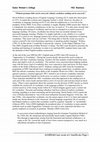
English is a key part of the Year One Higher Diploma in Business Programme (HD1) at the Dubai Wom... more English is a key part of the Year One Higher Diploma in Business Programme (HD1) at the Dubai Women’s College (DWC) in the United Arab Emirates. Several years ago, the HD1 English faculty team decided to prioritize the teaching and learning of vocabulary to try and help students better cope with the demands of their coursework. The target vocabulary for HD1 is the Academic Word List (AWL). As Coxhead points out, the AWL is more than just a list, it can be used as a basis to ‘set vocabulary goals….construct relevant teaching materials, and help students focus on useful vocabulary items.’ The AWL is comprised of the ‘semi-technical’ lexis that assists students in their English language academic development and Business studies.
This article traces the development of HD1’s approach to the teaching and learning of vocabulary over 2-3 years, the central importance of independent student learning and research, the use of technology in facilitating the process, and the assessment procedures developed.
The ideas discussed areeminently ‘transferable’ and applicable in other contexts.
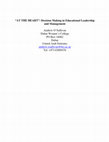
Johnson and Kruse (2009) state that “decision making lies at the heart of managerial behaviour in... more Johnson and Kruse (2009) state that “decision making lies at the heart of managerial behaviour in all organizations” (p.26) including educational ones. How decision making happens and how it works in educational leadership settings is an under examined area. This paper presents an extensive critical review of the literature spanning different disciplines on decision making. The three main styles of the phenomenon are identified as rational, arational and collaborative. A model incorporating the three styles is proposed. This model also accounts for various other influences which affect the process. The predilection for the idealized ‘hard’ rational paradigm of decision making is critiqued, and the comprehensive model presented in the paper is advanced as a more realistic representation of decisional processes in educational organizations. The writer concludes that the broader model of decision with its combination of rational and arational elements and collaborative mechanisms making results in a fuller and richer decision making
process.
Keywords: decisions; decision making; educational leadership;
ELT Journal, Jan 1, 1993
A review of the 3 volume series 'Handbooks for the Teaching of English to Arab Students' publishe... more A review of the 3 volume series 'Handbooks for the Teaching of English to Arab Students' published by Longman in 1989.
Errors in English Among Arabic Speakers: Analysis and Remedy
by
Nayef Kharma and Ali Hajjaj
Methods of Teaching English to Arabic Students
by
Najat Al Mutawa and Taiseer Kailani
English Pronunciation for Arabic
Speakers
by
T. F. Mitchell and Shahir El Hassan
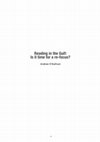
Cultivating real readers : emerging theory and practice for adult Arab learners, Jan 1, 2009
In this article I would like make the case that many Gulf Arab college students have a sig... more In this article I would like make the case that many Gulf Arab college students have a significant‘deficit’ in their English language reading skills. I will argue that the reasons for this shortfall are many and the interplay among different factors is complex. In order to take something of an ‘Occam’s Razor’ to the thorny and complicated question of how we can improve our students’ English reading competence, I am going to propose that we need to focus the majorpart of our efforts on improving two elements of our students’ reading development: the socalled ‘bottom-up’ reading elements; and the acquisition and development of vocabulary. I dothis as I feel there have been a multitude of diverse initiatives and responses to our students’reading issues over the years. From my own personal experience I can cite a plethora of effortsI have been involved in including: extended reading programmes, reading in the community,reading portfolios, reading competitions, reading speed software, intensive online reading, andsustained silent reading. The wide variety of programmes and schemes can certainly point tosome success. I fully acknowledge the pedagogic and motivational desirability of varied anddiverse reading activities for students yet I would also argue that in tandem with such effortsto assist our learners develop their English reading skills we should also urgently examine theapparent need to address many of our students’ fundamental problems with English reading skills.
The Reading Matrix, Jan 1, 2004
This article discusses some issues concerning the teaching and learning of reading at the Higher ... more This article discusses some issues concerning the teaching and learning of reading at the Higher Colleges of Technology in the UAE. The situation of reading within the HCT, concerns relating to the teaching and development of the skill and directions for reading in the future are all discussed.
Electronic version] The English Teacher XXVIII, Jan 1, 1999
The English Teacher Vol XXVIII June 1999 USING NEWSPAPER TEXT IN THE TEACHING OF GRAMMAR Andrew I... more The English Teacher Vol XXVIII June 1999 USING NEWSPAPER TEXT IN THE TEACHING OF GRAMMAR Andrew I. O'Sullivan CELPAD, International Islamic University Malaysia. (This article is based on an original presentation ...
Book Reviews by Andrew O'Sullivan
Becoming Your Best (the In-house learning and development newsletter of Pilgrims Shared Services), 2023
This slim, concise and clearly written book is extremely useful to anyone charged with decision-m... more This slim, concise and clearly written book is extremely useful to anyone charged with decision-making responsibility; or to anyone wanting to enhance their own insight and skills in this area. It captures 50 of the leading decision making models currently around and presents them in an accessible summarized form eminently suited to the busy schedules of working people.




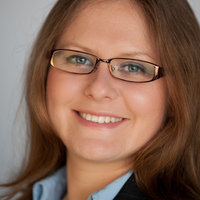






Uploads
Papers by Andrew O'Sullivan
Lauder, H., Brown, P. and Halsey, A.H. (2009) Sociology of education: a critical history and prospects for the future. Oxford Review of Education, 35 (5): 569-585
Oakley, A (2002) Social science and evidence- based everything: The case of education. In Educational Review, Vol. 54, (3): 277-286
Dubai in the United Arab Emirates (UAE) is acclaimed the poster child of the boom in international education with record numbers of such schools in operation in the Arab emirate and more slated to open over the next decade. Despite this spectacular growth there is surprisingly little in the literature on international education about the Dubai context. This paper attempts to address that gap in a small way.
The private international education sector’s growth is examined with reference to statistics describing the expansion and to the notion of Dubai as an educational hub. The nomenclature and typology of the study of international schools are investigated and the claim that many of the more recently established private schools in Dubai are “international” is interrogated.
The evolution of the modern education sector is presented in summary capturing the main trends and changes particularly since the constitution of the UAE federation in 1971 highlighting the “crisis” rhetoric which has emerged around the public K12 provision in Dubai in the last twenty years.
The “flight” of local students to the private sector schools is discussed and compared with the phenomenon in other jurisdictions. While there are some common cross-national drivers which explain this flight, this paper also argues that the Dubai government promotes the uptake of private education by national families as a solution to the intractable problem of declining public K12 school quality, in line with the government’s own voluntary embrace of neoliberal market led reform ideologies (Marginson 1999).
Finally, the move of local host national students to the private international schools is problematized in terms of the potential problems it may pose for questions of national identity and class cohesion and equity within the UAE National community in Dubai.
This article traces the development of HD1’s approach to the teaching and learning of vocabulary over 2-3 years, the central importance of independent student learning and research, the use of technology in facilitating the process, and the assessment procedures developed.
The ideas discussed areeminently ‘transferable’ and applicable in other contexts.
process.
Keywords: decisions; decision making; educational leadership;
Errors in English Among Arabic Speakers: Analysis and Remedy
by
Nayef Kharma and Ali Hajjaj
Methods of Teaching English to Arabic Students
by
Najat Al Mutawa and Taiseer Kailani
English Pronunciation for Arabic
Speakers
by
T. F. Mitchell and Shahir El Hassan
Book Reviews by Andrew O'Sullivan
Lauder, H., Brown, P. and Halsey, A.H. (2009) Sociology of education: a critical history and prospects for the future. Oxford Review of Education, 35 (5): 569-585
Oakley, A (2002) Social science and evidence- based everything: The case of education. In Educational Review, Vol. 54, (3): 277-286
Dubai in the United Arab Emirates (UAE) is acclaimed the poster child of the boom in international education with record numbers of such schools in operation in the Arab emirate and more slated to open over the next decade. Despite this spectacular growth there is surprisingly little in the literature on international education about the Dubai context. This paper attempts to address that gap in a small way.
The private international education sector’s growth is examined with reference to statistics describing the expansion and to the notion of Dubai as an educational hub. The nomenclature and typology of the study of international schools are investigated and the claim that many of the more recently established private schools in Dubai are “international” is interrogated.
The evolution of the modern education sector is presented in summary capturing the main trends and changes particularly since the constitution of the UAE federation in 1971 highlighting the “crisis” rhetoric which has emerged around the public K12 provision in Dubai in the last twenty years.
The “flight” of local students to the private sector schools is discussed and compared with the phenomenon in other jurisdictions. While there are some common cross-national drivers which explain this flight, this paper also argues that the Dubai government promotes the uptake of private education by national families as a solution to the intractable problem of declining public K12 school quality, in line with the government’s own voluntary embrace of neoliberal market led reform ideologies (Marginson 1999).
Finally, the move of local host national students to the private international schools is problematized in terms of the potential problems it may pose for questions of national identity and class cohesion and equity within the UAE National community in Dubai.
This article traces the development of HD1’s approach to the teaching and learning of vocabulary over 2-3 years, the central importance of independent student learning and research, the use of technology in facilitating the process, and the assessment procedures developed.
The ideas discussed areeminently ‘transferable’ and applicable in other contexts.
process.
Keywords: decisions; decision making; educational leadership;
Errors in English Among Arabic Speakers: Analysis and Remedy
by
Nayef Kharma and Ali Hajjaj
Methods of Teaching English to Arabic Students
by
Najat Al Mutawa and Taiseer Kailani
English Pronunciation for Arabic
Speakers
by
T. F. Mitchell and Shahir El Hassan